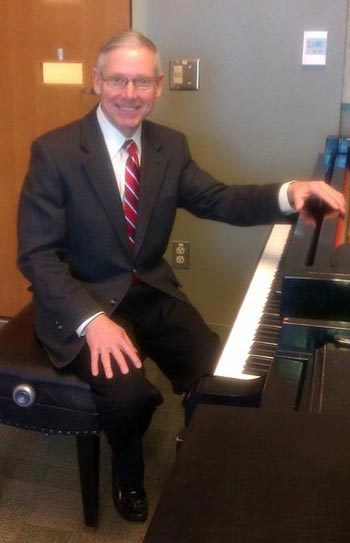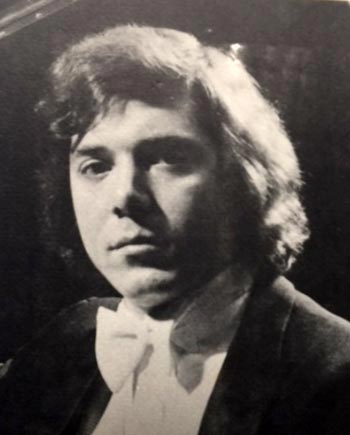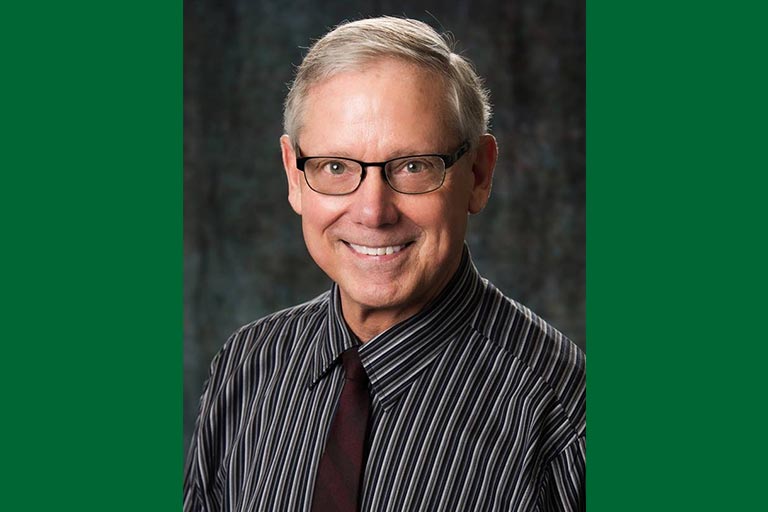Dr. John Olsen, professor of music and former interim dean of the College of Fine Arts at Eastern New Mexico University, says that note-perfect musicians can give bad performances, while the less technically-proficient can be awe-inspiring.
"Artists' lives are reflected in the emotions of their playing," Dr. Olsen said. "Notes are just tools which reflect and express these experiences."
His music career began in 1953 with a vivacious Russian woman in a huge Plymouth pulling up beside the six-year-old on a New Jersey street and, with dramatic flourishing motions, waving him over.
The total stranger, a retired opera singer who lived down the street in Little Silver, New Jersey, wanted to know if the small boy wanted to take piano lessons. While the encounter was unusual 65 years ago, it didn't elicit quite the suspicion it would today. Dr. Olsen told the woman, Marta Bohenna, that he would ask his parents.
The rest is — choose your cliché — history, a star is born, even (ahem) academic. No matter the choice, since that peculiar encounter, the master pianist has been passionate about music.
"At first, my parents were skeptical," Dr. Olsen said. "I don't know if they thought I wouldn't stick with it, or were suspicious of such an unusual lady."
Eventually, Dr. Olsen took lessons from Ms. Bohenna from 3:30-5 p.m. five days a week. His parents paid for one and four were complimentary. He learned to play the classics, including Bach and Mozart.
"She was very strict," said the veteran pianist who earned a 1982 doctor of musical arts degree from the University of Southern California. "I remember her hitting my fingers with a pencil when I'd play incorrectly. She taught through fear, which is not a tactic I prefer."
Dr. Olsen, who received a 1973 master's degree from The Manhattan School of Music, has nothing but good memories of his parents' attitude. "My parents were incredibly supportive. Before the Metropolitan Opera moved to Lincoln Center in New York City, my mother introduced me to opera at the old Met with a production of Aida. I still remember the famous horseshoe seats and all the red velvet."
"When I was in grade school and the other kids played sports, I loved music. I played for assemblies, Christmas concerts and such. My (fraternal) twin brother was into sports, so that gave us each our own little niche and kept us from being threats to each other."
His dedication to music did not preclude him from other hobbies, mostly involving water: skiing, sailing and swimming. "When I was older, I bought a little boat and learned to sail," Dr. Olsen remembered while admitting that his biggest adjustment to New Mexico was its ocean-less terrain.
Before Ms. Bohenna moved to Florida to escape the biting New Jersey winters, she introduced him to Greta Hilger, who played piano in a famous European trio and whose sister Elsa was first cellist in the Philadelphia orchestra under Eugene Ormandy for many years.

One Saturday, Ms. Hilger took Dr. Olsen, who received a 1971 bachelor's degree in piano performance from the Hartt College of Music in Connecticut, to Albert Einstein's modest house in Princeton, New Jersey. Although the Nobel Prize-winning genius played violin, what the seven-year-old remembers most is Einstein's Mickey Mouse shirt.
Dr. Olsen, who did post-doctoral studies at Columbia University in 1986-87, studied with Ms. Hilger through grammar school, then his father decided that he needed someone more acquainted with English. He enrolled in Christian Brothers Academy in Lincroft, New Jersey, where he continued his music education. He also was accepted into the Juilliard Prep School, where he studied on weekends.
"My one attempt at composing ended in humiliation," Dr. Olsen admitted with the wry smile bought with time. "I composed and played what I thought was a beautiful piece and asked what they thought. They said they loved the playing — but my composition was terrible!"
At 15, Dr. Olsen, who had long been interested in philosophy and religion, heeded another calling — the priesthood. His father was Lutheran and his mother was Catholic — though they never pressured him about religion.
Despite his father's misgivings, Dr. Olsen transferred to St. Francis Seminary, a boarding /prep school on Staten Island, New York. His father had one stipulation: His son had to continue weekend lessons at the conveniently-close Juilliard.
According to the master pianist, seminary was remarkably similar to the military. He'd get up at 5 a.m. and go to bed at 10 p.m. He was also required to participate in all the basic sports, discovering that he was bad at basketball, but excelled in track — especially the 100-yard dash. His speed also made him good at the skill positions in football.
He says that the seminary gave him a "sense of service. Living in such a community life you learn quickly about compromising and giving."
His flirtation with the priesthood lasted until he was 19. After four years, he was becoming more aware of himself as a musician than as a priest.
Dr. Olsen says that he felt he could be of more service as a teacher and musician. "I found that music brings people closer together, while belief systems can force a separation.
"This is why music is so remarkable; there is such integrity, beauty, honesty and purity in the work itself. No music is without emotion. The greatest artists are those in sync with their emotions. It is a synthesis far greater than I have experienced anywhere else."
The 1996-97 visiting professor of piano at the University of Montana says that 19th-century romantic music accentuates this point. "I love playing this romantic music. 19th-century music was the age of emotion and feeling in the melody. It is about the artist as an individual and personality."
By contrast, Dr. Olsen, who has performed throughout the U.S. and Europe, says that in the 18th-century structure was the central element and in the 20th century it was rhythm. "That's sad because I think the melody is what music will be remembered for," he opined.
Although he plays classical music, the former child of the 60s is not snobbish about popular music. He went to the first-ever U.S. concert by the Rolling Stones., and has seen Heart, the Four Seasons and many others of that era.
"I loved the 60s and 70s," the former long-hair said admiringly. "The harmonies of the Beatles, Beach Boys and the Mamas and Pappas were awesome. I respect all of those musicians and think many were geniuses in their own way."
Dr. Olsen, who performs at Eastern on a Concert Grand Steinway donated by alumnus Jim Slone, believes that an artist's life impacts his or her performances.
"As musicians, we're the sum of our experiences. You start with an idea, then translate it into a feeling. As your emotional depth increases, so does your playing. As an artist, you have to be vulnerable enough to wear your heart on your sleeve."
No matter how nervous he may be in the wings, Dr. Olsen says that once he hits the stage, he feeds off the audience. "You sense right away if the audience is with you. If they're indifferent, you have to make your playing more passionate and beautiful. Music is a competitive sport: You have to be mentally and physically at your peak. To use a sports term, you have to play to win."
He says that endless practice is necessary so that the tactile skill of pressing the right keys becomes secondary to the emotions educed.
"You can play note-perfect and still have a bad performance. Emotionally, I've never played the same piece twice the same way," he said.
Although he has spent a lifetime in the solitary pursuit, Dr. Olsen concedes, "I will never be perfect until I'm facing straight up or down."

Even though he has studied at such illustrious beacons as Juilliard, The Manhattan School of Music, the University of Southern California, and taught at the Brooklyn Conservatory of Music, California State University and other high-profile schools, he says he has stayed at ENMU because of the student-oriented philosophy.
"I've studied at places where the student was considered the lesser person than the artist-teacher. I don't like that; I find this a much healthier atmosphere because teachers are committed and dedicated to students and the growth of music in their lives," Dr. Olsen said. "I find working at Eastern very rewarding because the emphasis is so different from the background in which I was trained."
The 29-year ENMU veteran says that four qualities are necessary for students to succeed: interest, talent, persistence and, most importantly, personality. "One student may be more talented, but the audience responds to the one playing with the most joy, personality and passion."
Dr. Olsen thinks the way music bridges the chasms of generation and background is remarkable. His many trips to China these past eight years working with piano students from the Sichuan Conservatory of Music in Chengdu, China, attest to music's universal language. "Nationalities, different cultures and language only strengthen my belief that the pursuit of beauty through music is an inherent quality in all people. We must continue to provide and support music education for everyone.
"If you're a scientist or doctor, you work every day with other experts in your field," he said. "One of the interesting aspects of music is that I can walk into the Music Building and there may be a five-year-old with a piano piece doing exactly what I'm doing — just on a different level."
Dr. Olsen notes that he can go to band camps, football games, parades, even rock concerts, and feel something in common with "little kids, street kids, college kids and old professors. No one has the right to tell another that they do not have talent. Talent is like an onion: You have to peel it to get to the core. At the core, we all have one thing in common — expressing the art of music."
Dr. Olsen says that he has never had a second's pause about his career choice. The myriad emotions expressed through his music transcend their roots into a harmonic convergence of growth and liberation.
"Music is the ultimate evolution," Dr. Olsen said. "With help from our dexterous fingers, the real difference between us and the rest of the animal kingdom is in the rhythm of our souls."



